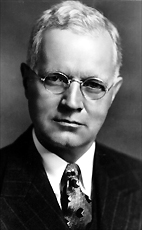Robert James Manion
Robert James Manion PC MC (born November 19, 1881 in Pembroke , Ontario , Canada , † July 2, 1943 in Ottawa ) was a Canadian doctor and politician who was chairman of the Conservative Party of Canada from July 1938 to May 1940 .
Life
After attending school, Manion studied medicine at Queen's University in Kingston and worked as a doctor after graduating. At the time of the First World War , he joined the Royal Canadian Army Medical Corps as a medical officer in 1915 and served in its 21st Battalion . He was awarded the Military Cross for his bravery in the battle of Vimy during the Battle of Arras in 1917 .
Manion began his political career when he was elected as a Unionist candidate in the House of Commons election on December 17, 1917 for the first time as a member of the House of Commons and there first the constituency of Fort William and Rainy River and, after the general election of October 29, 1925, the constituency of Fort William .
On September 22, 1921, he took over in the 11th Cabinet of Canada under the leadership of Prime Minister Arthur Meighen for the first time a government office and was until December 28, 1921 Minister for the civil reintegration of soldiers.
In the 13th Canadian Cabinet , also formed by Prime Minister Meighen , he was from June 29 to July 12, 1926, at the same time acting postmaster general , minister of health, minister for the civil reintegration of soldiers, minister of labor and minister for immigration and colonization. He was then Minister of Post until September 24, 1926. In 1927 he ran for the position of chairman of the Conservative Party, but was subject to Richard Bedford Bennett .
On August 7, 1930, he resigned his mandate in the House of Commons, after he was Minister for Railways and Canals in the 15th Cabinet of Prime Minister Richard Bedford Bennett on August 7, 1930 and held this office until October 23, 1935. On 25 August 1930 he was, however, in a by-election ( by-election ) in the constituency Fort William re-elected as deputies of the lower house.
In the general election of October 14, 1935 , he suffered an electoral defeat and resigned from the lower house. In a by-election in the London constituency on November 14, 1938, he was re-elected as a member of the House of Commons, but then lost this mandate in the subsequent general election on March 26, 1940 . After he had succeeded Richard Bedford Bennett as chairman of the Conservative Party in July 1938, he was in this general election as the leader of the opposition and challenged Prime Minister William Lyon Mackenzie King , who won the election with his Liberal Party . He then became a member of the National Government Party , while Arthur Meighen succeeded him as Chairman of the Conservative Party.
Web links
| personal data | |
|---|---|
| SURNAME | Manion, Robert James |
| BRIEF DESCRIPTION | Canadian doctor and politician |
| DATE OF BIRTH | November 19, 1881 |
| PLACE OF BIRTH | Pembroke , Ontario , Canada |
| DATE OF DEATH | July 2, 1943 |
| Place of death | Ottawa |
